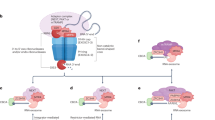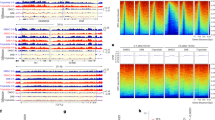Abstract
p53 is a cellular phosphoprotein that is present at elevated concentrations in cells transformed by different agents1–5. p53 complementary DNA expression-constructs immortalize primary cells in vitro6,7 and co-operate with an activated ras oncogene in malignant transformation6,8,9. Several reports have implicated p53 in mammalian cell cycle control and specifically with events occurring at the G0–G1 boundary10,11. p53 forms specific complexes with simian virus 40 (SV40) large-T antigen1,2, and such complexes are found associated with both replicating and mature SV40 DNA in lytically infected cells12. In an accompanying paper Gannon and Lane13 report that in in vitro plate-binding assays, mouse p53 can displace polymerase α from complex with T-antigen. We have examined the in vivo consequences of expressing wild-type and mutant p53 proteins from other species in SV40-transformed monkey cells. We report here that expression of mouse p53 results in a substantial and selective inhibition of SV40 origin-dependent DNA replication. In addition to any function in the G0-G1 transition, the data presented suggest that p53 may affect directly the initiation or maintenance of replicative DNA synthesis.
This is a preview of subscription content, access via your institution
Access options
Subscribe to this journal
Receive 51 print issues and online access
$199.00 per year
only $3.90 per issue
Buy this article
- Purchase on Springer Link
- Instant access to full article PDF
Prices may be subject to local taxes which are calculated during checkout
Similar content being viewed by others
References
Lane, D. P. & Crawford, L. V. Nature 278, 261–263 (1979).
Linzer, D. I. H. & Levine, A. J. Cell 17, 43–52 (1979).
DeLeo, A. B. et al. Proc. natn. Acad. Sci. U.S.A. 76, 2420–2424 (1979).
Rotter, V., Boss, M. A. & Baltimore, D. J. Virol 38, 336–346 (1981).
Ruscetti, S. K. & Scolnick, E. M. J. Virol. 46, 1022–1026 (1983).
Jenkins, J. R., Rudge, K. & Currie, G. A. Nature 312, 651–654 (1984).
Jenkins, J. R., Rudge, K., Chumakov, P. & Currie, G. A. Nature 317, 816–818 (1985).
Eliyahu, D., Raz, A., Gruss, P., Givol, D. & Oren, M. Nature 321, 646–649 (1984).
Parada, L. F., Land, H., Weinbereg, R. A., Wolf, D. & Rotter, V. Nature 312, 649–651 (1984).
Mercer, W. E., Nelson, D., DeLeo, A. B., Old, L. J. & Baserga, R. Proc. natn. Acad. Sci. U.S.A. 79, 6309–6312 (1982).
Reich, N. C. & Levine, A. J. Nature 308, 199–201 (1984).
Tack, L. C., Wright, J. H. & Gurney, E. G. J. Virol. 58, 635–646 (1986).
Gannon, J. V. & Lane, D. P. Nature 329, 456–458 (1987).
Cullen, B. R. Cell 46, 973–982 (1986).
Gluzman, Y. Cell 23, 175–182 (1981).
Li, J. J. & Kelly, T. J. Molec. cell. Biol. 5, 1238–1246.
Stillman, B. W. & Gluzman, Y. Molec. cell. Biol. 5, 2051–2060.
Yewdell, J. W., Gannon, J. V. & Lane, D. P. J. Virol. 59, 444–452 (1986).
Dippold, W. G., Jay, G., DeLeo, A. B., Khoury, G. & Old, L. J. Proc. natn. Acad. Sci. U.S.A. 78, 1695–1699 (1981).
Jenkins, J. R., Rudge, K., Redmond, S. & Wade-Evans, A. Nucleic Acids Res. 12, 5609–5626 (1984).
Southern, P. J. & Berg, P. J. molec. appl. Genet. 1, 327–341 (1982).
Traganos, F., Darzynkiewicz, Z., Sharpless, T. & Melamed, M. R. J. Histochem. Cytochem. 25, 46–56 (1977).
Murray, J. D., Bellett, A. J. D., Braithwaite, A. W., Waldron, L. K. & Taylor, I. W. J. cell. Physiol. 111, 89–97 (1982).
Sturzbecher, H.-W., Chumakov, P., Welch, W. J. & Jenkins, J. R. Oncogene 1, 201–211 (1987).
Wade-Evans, A. thesis, Univ. of London (1986).
Campbell, J. L. A. Rev. Biochem. 55, 733–771 (1986).
Smale, S. T. & Tjian, R. Molec. cell. Biol. 6, 4077–4087 (1986).
Tooze, J. (ed.) DNA Tumor Viruses (Cold Spring Harbor, N.Y., 1980).
Murakami, Y., Wobbe, C. R., Dean, F. B., Weissbach, L. & Hurwitz, J. in Cancer Cells Vol. 4 (Cold Spring Harbor, N.Y., 1986).
Hirt, B. J. molec. Biol. 26, 365–369 (1967).
Hanahan, D. J. molec. Biol. 166, 557–580 (1983).
Author information
Authors and Affiliations
Rights and permissions
About this article
Cite this article
Braithwaite, A., Sturzbecher, HW., Addison, C. et al. Mouse p53 inhibits SV40 origin-dependent DNA replication. Nature 329, 458–460 (1987). https://doi.org/10.1038/329458a0
Received:
Accepted:
Issue Date:
DOI: https://doi.org/10.1038/329458a0
This article is cited by
-
Ribosomal L1 domain-containing protein 1 coordinates with HDM2 to negatively regulate p53 in human colorectal Cancer cells
Journal of Experimental & Clinical Cancer Research (2021)
-
p53 represses human papillomavirus type 16 DNA replication via the viral E2 protein
Virology Journal (2008)
-
p53 promotes adenoviral replication and increases late viral gene expression
Oncogene (2006)
-
Nuclear localization of Y-box factor YB1 requires wild-type p53
Oncogene (2003)
-
Wild-type p53 inhibits replication-associated homologous recombination
Oncogene (2002)
Comments
By submitting a comment you agree to abide by our Terms and Community Guidelines. If you find something abusive or that does not comply with our terms or guidelines please flag it as inappropriate.



